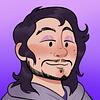You need to sign in or sign up before continuing.
Take a photo of a barcode or cover
Oh, this is much better than Rocannon's World. I still have some issues with it, but this is a tight book, not branching off too much. Definitely a step up, imo.
adventurous
emotional
reflective
sad
fast-paced
Plot or Character Driven:
A mix
Strong character development:
Complicated
Loveable characters:
Complicated
Diverse cast of characters:
No
Flaws of characters a main focus:
Complicated
There was a single survivor of an advanced civilization stranded on a primitive planet in the first book. For the second, there's an entire lost colony that has been stranded for ~600 years. The book switches viewpoints between Rolery, a female of the Tevaran, one of the native humanoids, and Jakob, one of the Terrans.
The Terrans have become very insular over the centuries, as shown by the statement that a certain woman was "his cousin ten times over, his sister-playmate-lover-companion." I felt that this book had a strong influence on some aspects of Game of Thrones. A quick search showed others thought similarly. The phrase "Winter was coming" is used, and is meant in the same way as in GOT because their winters are very long, nearly 15 years, and harsh. There were various other similarities.
There are snowghouls, which play a rather minor role. I thought they were going to be snow zombies, but they were not-yeti. There's also a part where a character almost says "Life finds a way". Probably half the book is a (moderate spoiler).
This book was very different from the first in many ways though it had a similar set-up. The book began with a lot of imagery that I enjoyed. I was surprised by how much I enjoyed reading this. It could have been better in various ways, and after going to sleep and then awaking I saw this more clearly. A lot of the names seemed to slightly off from their real-world counterparts, but that's fine, and in some ways to be expected. There's a character named Jonkendy which immediately made me think of JFK and he's, so yeah, I don't know if that was meant to be a reference or not.
The Terrans have become very insular over the centuries, as shown by the statement that a certain woman was "his cousin ten times over, his sister-playmate-lover-companion." I felt that this book had a strong influence on some aspects of Game of Thrones. A quick search showed others thought similarly. The phrase "Winter was coming" is used, and is meant in the same way as in GOT because their winters are very long, nearly 15 years, and harsh. There were various other similarities.
There are snowghouls, which play a rather minor role. I thought they were going to be snow zombies, but they were not-yeti. There's also a part where a character almost says "Life finds a way". Probably half the book is a (moderate spoiler)
Spoiler
siege on the last remaining Terran city, Landin, by the not-Mongol hordes led by Kubben (not-Kublai)This book was very different from the first in many ways though it had a similar set-up. The book began with a lot of imagery that I enjoyed. I was surprised by how much I enjoyed reading this. It could have been better in various ways, and after going to sleep and then awaking I saw this more clearly. A lot of the names seemed to slightly off from their real-world counterparts, but that's fine, and in some ways to be expected. There's a character named Jonkendy which immediately made me think of JFK and he's
Spoiler
killed later on
adventurous
tense
medium-paced
Plot or Character Driven:
Plot
Strong character development:
Yes
Loveable characters:
No
Diverse cast of characters:
Yes
Flaws of characters a main focus:
Complicated
So incredibly ahead of its time with the concept of aliens and “the other” and belonging! What is a neighbor? A LOVE STORY and a quick read! Amazing and mind blowing as all of Ursula’s creations!!!
Despite a promising setting, this story was not too intriguing for me, and its execution fell flat. I would've liked to read more about these long winters and the future of the humans and the hilfs on this planet; instead we got the plot with the gaal and its one battle, which were anticlimactic. As in Rocannon's World, the concept of mindspeech is again underdeveloped, not really used, and would have way more consequences for a society than was shown.
The prose was, as usual for LeGuin, very beautiful and made it an easy and enjoyable read for me despite not being very satisfied with the plot.
The prose was, as usual for LeGuin, very beautiful and made it an easy and enjoyable read for me despite not being very satisfied with the plot.
adventurous
fast-paced
Plot or Character Driven:
A mix
Strong character development:
Yes
Loveable characters:
Yes
Flaws of characters a main focus:
Yes
adventurous
medium-paced
Plot or Character Driven:
Plot
Strong character development:
No
Loveable characters:
N/A
Diverse cast of characters:
N/A
Flaws of characters a main focus:
No
These so-called Hainish Cycle books of Le Guin's that I've been reading lately have really grabbed my interest. Can you tell? I've just been devouring copies from the local public library. Planet of Exile is the latest. This story is the background for City of Illusions, the last Hainish book I read, but it really doesn't matter what order you read them in. I love how the chronology of the stories has no relation to which order they were written in -- and how sometimes the "Hain-ish-ness" is strong, and sometimes hidden well below the surface.
Unlike some of the other books in the cycle, the characters don't do a lot of traveling, and the time period of the novel is relatively short. Le Guin plays with what happens to a group of scientists who, for all intents and purposes, were abandoned 600 years ago (or 10, depending on your star of reference) on a planet they are studying. After a rocky start, they more or less get along with the natives, bu have never really integrated into their new home, neither culturally nor biologically. But there are signs that this could be changing. These groups are going to have to get along, because hostile tribes are on the move. And, on a planet whose years last 60 earth years, the harsh winters last 15 years...
A gripping story told from both groups' points of view. I love how Le Guin can create, and describe, two very different mindsets.
Unlike some of the other books in the cycle, the characters don't do a lot of traveling, and the time period of the novel is relatively short. Le Guin plays with what happens to a group of scientists who, for all intents and purposes, were abandoned 600 years ago (or 10, depending on your star of reference) on a planet they are studying. After a rocky start, they more or less get along with the natives, bu have never really integrated into their new home, neither culturally nor biologically. But there are signs that this could be changing. These groups are going to have to get along, because hostile tribes are on the move. And, on a planet whose years last 60 earth years, the harsh winters last 15 years...
A gripping story told from both groups' points of view. I love how Le Guin can create, and describe, two very different mindsets.





